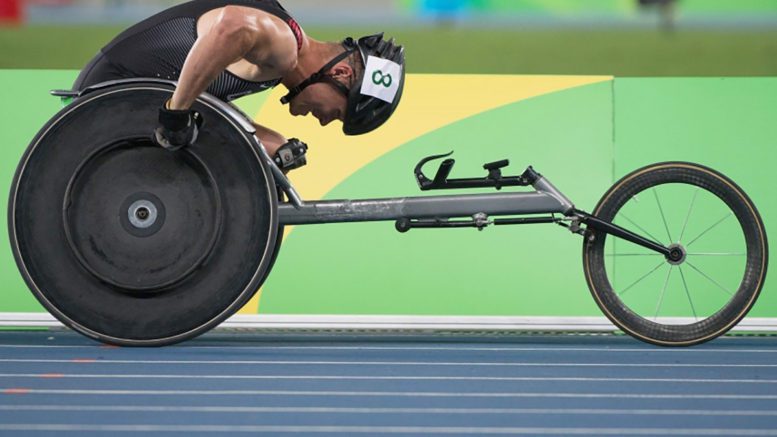Alexandre Dupont doesn’t become a Canadian Paralympian without losing his right leg in a motorcycle accident, but that in itself is not what characterizes his success as an athlete.
And that’s where many para performers believe media coverage can go wrong — focussing too much on the disability and not enough on the trials and achievements of a world class athlete.
“I’m not a big fan of getting questions about disability and inspiration,” said Dupont. “Like no, I just bust my butt, sweat my ass off and train to go as fast as I can. I’m an athlete.”
The wheelchair racer, who won a bronze medal in the 4 x 400m relay at the 2016 Rio Paralympic Games, said sometimes people perceive what he does as a hobby or a good way for him to kill time. That’s something he has no time for.
“It’s not a hobby, it’s a lifestyle,” he said from his home in Clarenceville, Quebec. “It’s our life, it’s what we do, it’s what we are.”
Other athletes say reporters occasionally approach their sport with a lack of understanding.
Madison Wilson-Walker is a blade runner who finished fourth in the T64 100m competition at the 2019 Parapan Am Games. The 22-year-old said she’s been asked if running with blades gives her an advantage. It’s a question that “drives [her] up the wall.
“It makes me feel like they think I’m cheating in a way, and it kind of degrades my disability,” she said. “It degrades me as an athlete as well.”
Guillaume Ouellet, a two-time Parapan Am T13 5000m gold medalist, has had a similar experience. The visually-impaired distance runner was once asked if having tunnel vision gave him an advantage in his races. He thought the question was comical.
“Well, it’s not really an advantage to see at 10 percent,” he said, as he laughed.
All the athletes said they’re happy when the media takes interest in their story though, and they know that part of it is an inspiring triumph over adversity.
“Sometimes these questions are redundant, but at the same time it’s part of my story, I have to tell it,” said Ouellet. “I take all media requests or interview requests, I’m trying to promote Paralympic sport as much as possible.
“So, in that sense, it doesn’t bother me.”

However, Canadian record-holding T46 sprinter Amanda Rummery said some reporters seem intent on milking those tragic elements of the story.
She said being asked questions like “What was your biggest regret?” and, “What was the saddest day of your life?” are clearly posed to have her speak about the all-terrain vehicle accident that injured her arm in 2015.
“You would never ask an able-bodied person what the saddest day of their life was.”
And that was the common theme throughout all the interviews. They want the same kind of questions able-bodied athletes are posed.
Rummery likes questions that get to the root of how she actually feels, and bring out more than a ‘cookie-cutter’ answer. Dupont enjoys talking about his training routine and teaching people about his racing equipment.
Ouellet likes being asked about what motivates him to run.
“It’s a simple question, but full of a meaning,” he said. “It’s a type of interesting question that I don’t get asked very often.”
Wilson-Walker wants to explain what competing for Canada means to her, and she wants to focus on what she has actually achieved.
“I’d rather talk about my athletic story, not my amputation story,” she said.

